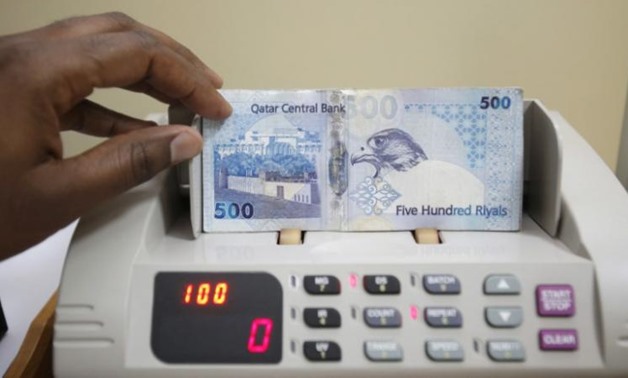
FILE PHOTO - A cashier counts Qatari riyal notes at a money changer in Doha May 28, 2013. REUTERS/Fadi Al-Assaad
3 July 2017:The Qatari riyal rose back to near its peg to the U.S. dollar on Monday as local banks returned from a week-long holiday and dominated the market, cooling speculation that economic sanctions might strain the peg to breaking-point.
Last week, with Qatari banks closed for five days of Eid al-Fitr holidays, foreign banks made nervous by the sanctions lacked onshore counterparties and traded the riyal QAR=D1 among themselves as low as 3.81 to the dollar, Reuters data showed.
That was far below the peg of 3.64, fuelling talk among some foreign traders that the sanctions against Qatar by Saudi Arabia, the United Arab Emirates, Bahrain and Egypt might eventually force the peg to be abandoned.
On Monday, however, Qatari banks were back in the market and once more accounting for most activity. The riyal changed hands at 3.6415 in the afternoon, after trading in a range of 3.6371 to 3.7331 earlier in the day.
State-owned Qatar National Bank, the Gulf's biggest listed bank, which is widely seen as an arm of Qatari government policy, was providing indicative quotes for the riyal QAR= at 3.6405/25 - unchanged from levels before the diplomatic crisis erupted in early June.
"The market is reflecting reality again," said one Qatari banker, who attributed last week's low rates for the riyal to poor liquidity among foreign banks as well as speculation.
The four Arab states have cut diplomatic and transport ties with Qatar, accusing it of backing terrorism. That prompted many Gulf and foreign banks, including several major British institutions, to halt or scale back their trading of the riyal.
The withdrawal of so many traders has created bottlenecks in the market, particularly between onshore and offshore banks, reducing supplies of dollars to offshore institutions and prompting them to quote the riyal lower.
But at onshore banks, not much has changed; the central bank is continuing to provide them with ample supplies of dollars for commercial purposes at a rate of up to 3.6415 under its peg mechanism, commercial bankers said.
AMPLE RESERVES
For many countries, the emergence of a gap between rates quoted by onshore and offshore traders has signaled a severe shortage of foreign currency and an eventual devaluation.
Egypt, for example, devalued last November after its pound weakened by more than 50 percent offshore and dollar holders were no longer willing to sell at the onshore rate, starving Egyptian banks of hard currency.
Qatar's case may be different, however. Most of its foreign income comes from oil and gas industries controlled by the government, which can ensure that dollar supplies are remitted home. And the hundreds of billions of dollars in its sovereign wealth fund would cover more than a decade of imports.
In an effort to allay doubts about trade in its currency, Qatar's central bank republished a statement on Monday saying the riyal's exchange rate was stable and that it would guarantee all exchange transactions for customers inside and outside the country. The statement was originally published last week.
The four Arab states have set a deadline of late Tuesday for Qatar to comply with their political demands, and have threatened additional, unspecified sanctions if the deadline is not met.
It is not clear, however, that the new sanctions would increase pressure on the riyal significantly. Gulf banks may withdraw deposits from Qatari banks, but Qatari authorities have more than enough funds to cover such withdrawals.
Saudi Arabian media have also said foreign companies may be told to choose between doing business in the four states or trading with Qatar.
Such a "secondary boycott" could be hard to enforce and break World Trade Organisation rules, however. A secondary boycott of Israel by Gulf Arab states was canceled in the 1990s, according to the Office of the U.S. Trade Representative.


Comments
Leave a Comment